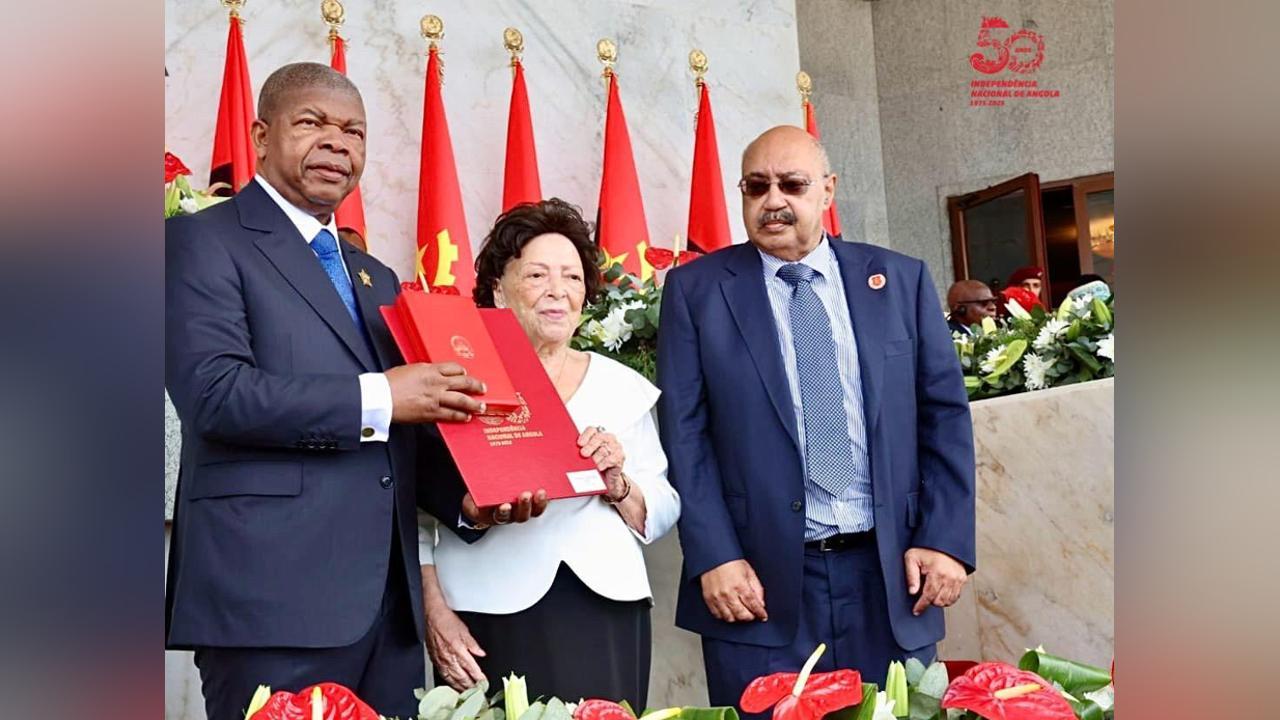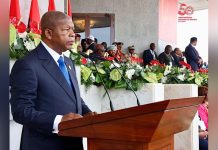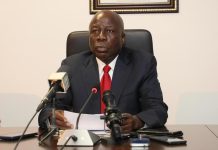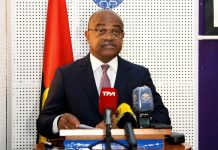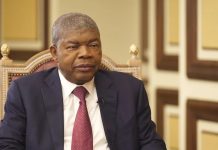Africa-Press – Angola. The founder of the Angolan nation, António Agostinho Neto, was posthumously awarded the Medal of Honor for the 50 Years of National Independence on Tuesday during the Jubilee celebrations held at independence square in Luanda.
In front of world leaders, the diplomatic corps, and an audience of more than 10,000 Angolans, President João Lourenço, awarded the distinction to the national hero, recognizing his historic role and absolute dedication to the cause of Angola’s liberation, unity, and sovereignty.
The medal was presented to Neto’s widow, Maria Eugénia Neto, accompanied by her son Mario Jorge da Silva Neto.
Five decades after the liberating echo of November 11, 1975, the figure of Agostinho Neto still stands as the greatest symbol of emancipation and national dignity.
The presentation of the medal is one of the most solemn moments of the festivities, symbolizing the gratitude of the Angolan people for the legacy of their first Head of State, whose thinking and example continue to inspire current generations.
The tribute to Agostinho Neto takes place fifty years after the proclamation of National Independence on November 11, 1975, in what was then Largo 1o de Maio, now Praça da Independência, in Luanda, under the name of the People’s Republic of Angola (RPA).
In the independence square, where the past meets the future, the name of Agostinho Neto echoed once again as an eternal symbol of sovereignty and national unity, inspiring present and future generations to continue on the path of peace, justice, and development.
Born on September 17, 1922, in Kaxicane (Icolo e Bengo), Agostinho Neto was a doctor, poet and statesman.
The memory of the doctor, poet, and statesman remains inseparable from the greatest milestone in national history, Independence, achieved on November 11, 1975.
Born into a Protestant family, Agostinho Neto grew up under the influence of an education marked by moral rigor and social awareness, son of a teacher and catechist, he came into contact with realities of exclusion and injustice from an early age, which would shape his worldview.
His time in Portugal, where he studied Medicine, was crucial for his political development.
In Lisbon, he joined circles of African students who questioned Portuguese colonialism and dreamed of free and sovereign societies.
He was persecuted, detained, and monitored by the PIDE (Portuguese political police), but he never abandoned his conviction that Angolan independence was inevitable.
Alongside his academic training and political engagement, Agostinho Neto established himself as a poet of resistance.
Book such as Sagrada Esperança (Sacred Hope) translated in verses, the suffering, dignity, and hope of Angolans.
His poetry was not merely a literary exercise, but a political manifesto, a cultural banner, and a symbolic weapon.
The poet gave voice to millions of Angolans silenced by colonialism, reinforcing the conviction that the struggle was just urgent.
Leadership in the Liberation Struggle
In 1960, Neto assumed the presidency of the Popular Movement for the Liberation of Angola (MPLA) while he was in the PIDE prisons. After escaping from prison, he fled to Congo-Leopoldville (present-day DRC), where he was elected its president.
The movement grew and consolidated internal mobilization networks and external alliances, during a period when colonial repression intensified.
The armed struggle, which began on February 4, 1961, was the turning point, although marked by divisions among the main nationalist movements, and the MPLA, under Neto’s leadership, asserted itself through its ability to articulate military combat with the diplomatic front.
His prestige as a statesman gained expression on the international stage, and Neto built bridges with progressive countries and the socialist bloc, especially the then Soviet Union and Cuba, whose support was crucial for the victory over Portuguese colonialism and, later, in the resistance against external interference.
The Carnation Revolution, on April 25, 1974, in Portugal, opened an irreversible window for the independence of the African colonies, and Agostinho Neto knew how to read the historical moment and position the MPLA as the legitimate force in leading the process.
Despite the armed confrontations with the FNLA and UNITA, and the interference of foreign powers that sought to condition the future of Angola, Neto firmly maintained the priority of guaranteeing total independence.
The Alvor Agreement, in January 1975, sealed Portugal’s decision to abandon Angola, but it was in Luanda, on November 11, that Agostinho Neto, before the national flag raised for the first time, solemnly proclaimed “before Africa and the World, the independence of Angola.”
Statesman and visionary
As President (1975-1979), Neto faced enormous challenges, such as building a state in the midst of civil war, reorganizing the economy, and the need to assert national unity.
Even in the face of difficulties, he laid the foundations for key sectors such as Education and Health, and maintained Angola as a bastion of the anti-colonial struggle in Africa, supporting liberation movements such as SWAPO (Namibia), the ANC (South Africa), and ZANU (Zimbabwe).
Agostinho Neto died on September 10, 1979, in Moscow, before seeing many of his projects for Angola realized.
However, his legacy remains alive, translated into the courage to confront an empire, the firmness in defending sovereignty, and the vision of a country built with the dignity of its people.
His life and work are a testament to the fact that Independence was achieved through incalculable sacrifices, but also through the unwavering strength of hope.
For More News And Analysis About Angola Follow Africa-Press

